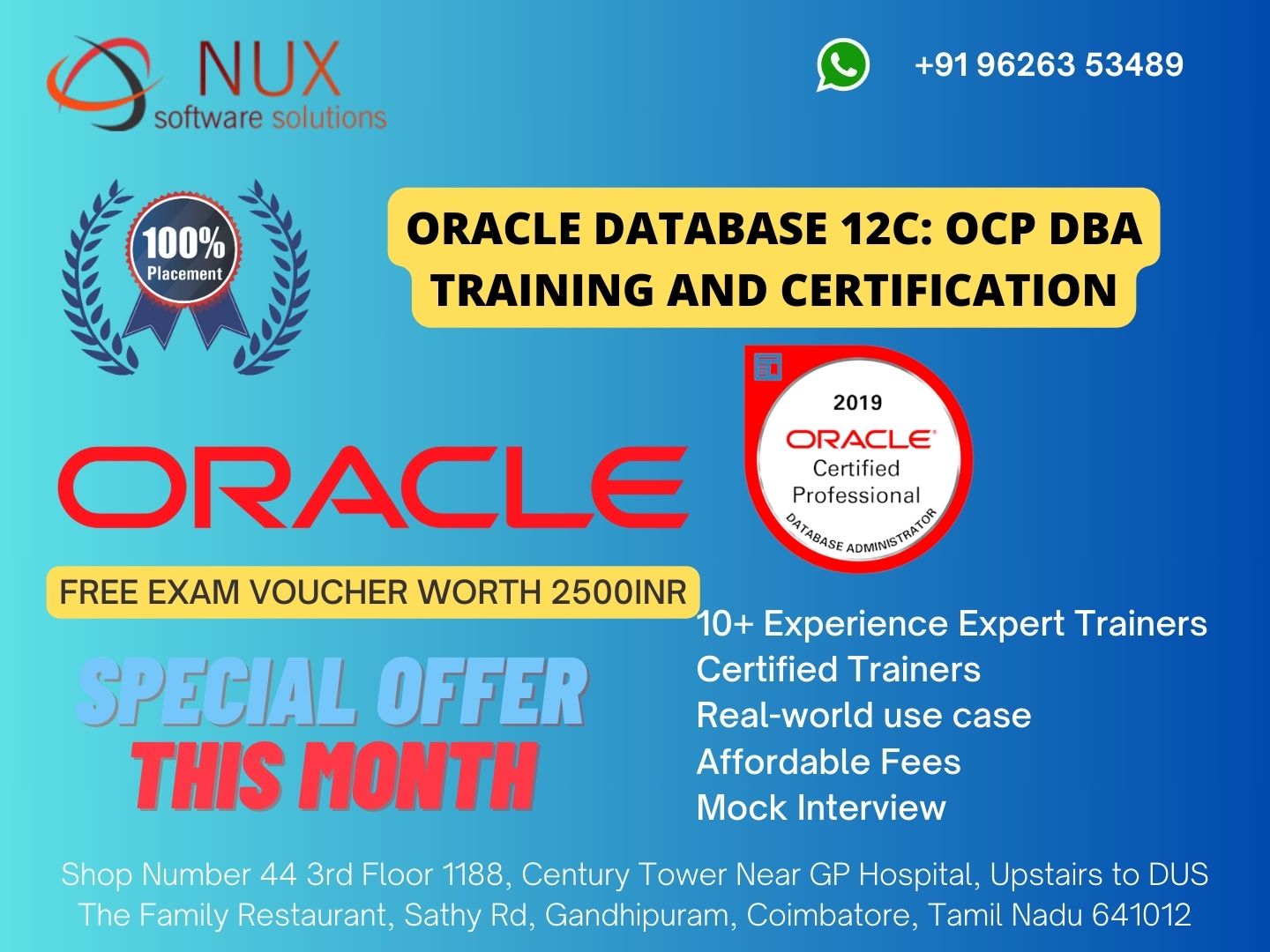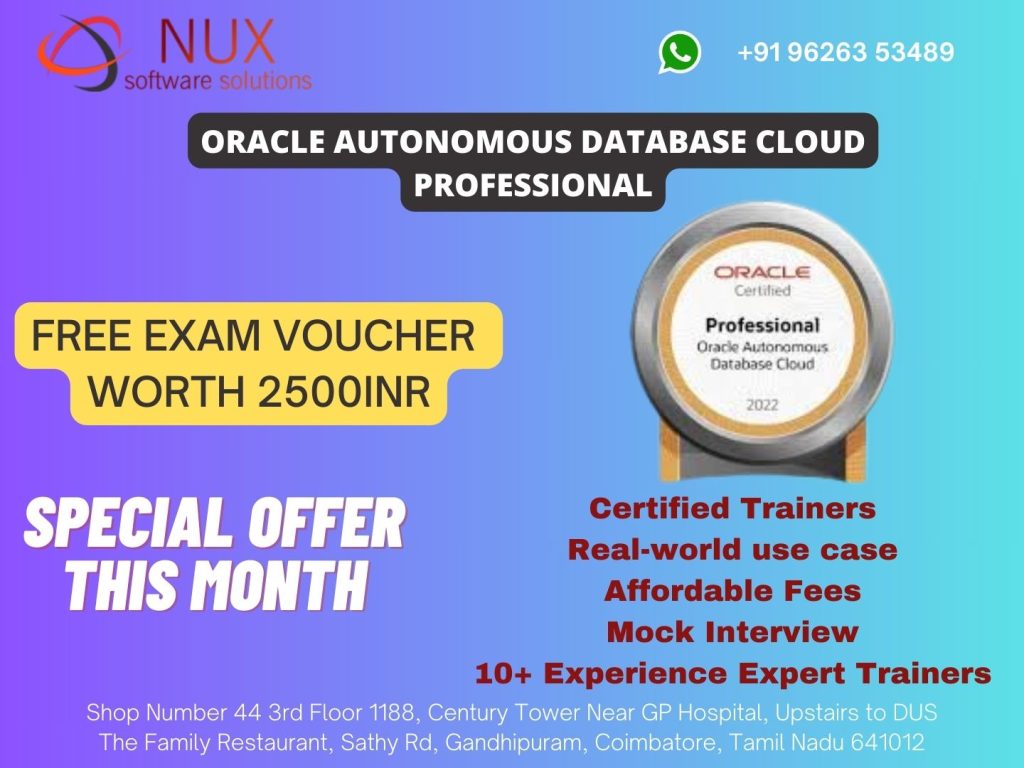Oracle Database 12c : OCP DBA

Course Summary
This training prepares professionals for the Oracle Database 12c OCP (Oracle Certified Professional) certification, building upon the foundational skills from the OCA level. The course focuses on advanced administration techniques, performance tuning, multitenant architecture (CDB/PDB), resource management, backup and recovery, and database security in Oracle 12c environments.
Ideal for working DBAs and IT professionals, this course is based on real-world scenarios and labs designed to align with Oracle’s best practices and the official OCP exam content.
Why Choose This Course
Oracle 12c introduced revolutionary architecture changes with multitenant databases and cloud-readiness. This course helps you:
Gain hands-on experience with pluggable databases (PDBs) and container databases (CDBs)
Understand real-world DBA operations including patching, cloning, RMAN recovery, and performance management
Prepare thoroughly for the Oracle 12c OCP certification exam (1Z0-063)
Learn from experienced instructors with a track record of Oracle project success
Advance your credentials for roles in enterprise-level database administration
Who Should Enroll
This course is ideal for:
Certified OCA 12c DBAs looking to progress to the next certification level
Working database administrators managing mission-critical Oracle environments
System architects and engineers handling database infrastructure
Professionals aiming to upgrade from Oracle 11g or earlier to the 12c platform
Organizations modernizing their data environments with cloud-ready Oracle DBs
Skills You Will Gain
Managing multitenant database architecture (CDBs and PDBs)
Performing database backup and recovery using RMAN in advanced scenarios
Implementing Data Guard, cloning, and automated maintenance tasks
Configuring database auditing, encryption, and user access controls
Monitoring and tuning SQL performance and database resources
Utilizing tools like Oracle Enterprise Manager (OEM) for centralized administration
Career Benefits
After completing this course, you will:
Be fully prepared to clear the Oracle 1Z0-063 OCP exam
Qualify for roles like Senior Oracle DBA, Database Consultant, or Infrastructure Lead
Gain advanced expertise to manage enterprise-grade, secure, and high-availability databases
Strengthen your profile for cloud migration projects and Oracle Fusion backends
Position yourself for future upgrades to Oracle 19c and Oracle Cloud Infrastructure (OCI)
Become a Certified Oracle 12c Professional
Oracle 12c OCP is one of the most respected certifications in database technology. This training ensures you’re ready to take on complex administrative tasks in modern IT environments.
Advance your Oracle DBA career today with Linux Training Center.
Course Syllabus
Modules
1.Introduction to database management systems and databases
What is a database?.
Popular database management system (DBMS) software and why Oracle DBMS.
History and Current trends of DBMS and Database Administration.
Oracle database market share and about its current competitive landscape.
Tasks of a Database Administrator.
2.Relational Database Model and Installing Oracle database software
Designing a relational database using Entity-Relationship Modeling.
Understand pre-requisites for a successful Oracle RDBMS software installation.
Installation of Oracle 11g R2 database software (Oracle DBMS).
Installation of Oracle 12c database software (Latest Release).
3.Oracle Database Architecture
Planning for an Oracle database creation.
Creating an Oracle database using the MANUAL method.
Creating an Oracle database using the Graphical Tool (Database Configuration Assistant).
Startup and Shutdown of a database.
Components of an Oracle database and detailed architecture.
Advance Startup and Shutdown Scenarios.
Oracle database memory and process architecture.
4.Database storage
Tablespaces and allocation types.
Create tablespaces.
Create datafiles with fixed size and autoextend option.
Control files and producing a trace output to view its contents.
How to rename datafiles in a controlfile.
Redolog File architecture and best practices.
Enabling Archivelog mode for a database with automatic archiving.
Temporary tablespaces and temporary tablespace groups (11g R2 new feature).
5.Oracle Networking
Introduction.
Oracle listener configuration (Dynamic and Static Listeners).
Dynamic Service Registration and Naming Methods configuration in sqlnet.ora.
Oracle database connections from other computers.
Using Oracle netca (Network Configuration Assistant) for network configuration file tnsnames.ora.
Oracle listener administration and TNS_ADMIN environment variable.
Database Links.
6.User Administration and Security
How to create database users.
How to set database profile limits for a user.
Unlocking a user account and enabling password management.
Oracle database authorization using object and system privileges.
Oracle database authorization using database roles.
How to audit Oracle database connections in standard and XML mode.
How to audit Oracle DBA commands (SYS Operations).
How to schedule Oracle database jobs using DBMS_SCHEDULER package.
7.Used Managed (Manual) Backup and Recovery
Introduction and planning for a robust Backup and Recovery Strategy.
How to take an Oracle database backup in offline mode (COLD BACKUP).
Hot to take an Oracle database backup in online mode (HOT BACKUP).
How to clone a database using Cold Backup.
How to clone a database using Hot Backup.
How to recreate source database from a user-managed backup (Media failure scenario).
8.RMAN Backup and Recovery
Advantages of RMAN method compared to manual method.
Database backup using RMAN in normal and compressed mode.
Oracle database backup metadata.
Database backup using Recovery catalog (RMAN Catalog).
Querying the RMAN metadata.
How to clone a database using RMAN duplicate (11g R2 new feature: Backup based duplication).
How to restore and recover a database using its backup in the event of a media failure.
Oracle database backup retention policies and backups to Tape/offsite.
Fast Recovery Area for better management of backups and archive log files.
9.Oracle database upgrades
Introduction to Oracle versions and how to understand a version.
How to upgrade from a previous release to Oracle 12c.
How to upgrade from one patchset to another patchset within a release. What is slip-streaming ?
What are one-off/interim patches.
What are quarterly CPU patches (Cumulative Patch Updates).
Learn about Oracle Interim Patch Installer (OPATCH).
Upgrade a database using dbua (database upgrade assistant) GUI tool.
10.Oracle 12c database creation (non-CDB) and new features
How to create a non-CDB (traditional database) using Oracle 12c dbca utility.
Learn about the improvements in dbca utility.
How to configure and use Oracle Enterprise Manager Database Express web based tool.
11.Oracle 12c's Multitenant Architecture
Understanding Container database (CDB) and Pluggable Database (PDB) in Oracle 12c release.
How Oracle 12c CDB,PDB instance architecture differs from Oracle 11g,10g instance architectures.
How to create a non-CDB database in Oracle 12c (Traditional database).
How to create a CDB database in 12c (using the multitenant feature).
How to move (plug) the non-CDB database into the CDB database as a pluggable database (PDB).
Real world Business use cases for using Oracle 12c Multitenant architecture.
12.Oracle Utilities
Oracle database logical backups.
Business use cases of logical backups compared to physical backups.
Data Pump Export modes.
Data Pump Import to import data from an export backup.
Advanced features in Oracle Data Pump Export.
13.Performance Tuning
How to handle performance issues in the real world.
V$ views for performance monitoring and analysis.
How to size the Oracle database memory structures for optimal performance.
Oracle database wait events.
Explain Oracle UNDO management internals and sizing.
Explain Oracle TEMP space internals and sizing.
SQL Query tracing using TKPROF.
Database wide tracing for Oracle Errors (Event Tracing).
Index Monitoring and internals of index maintenance by Oracle.
Statistics data collection for Oracle database optimizer.



